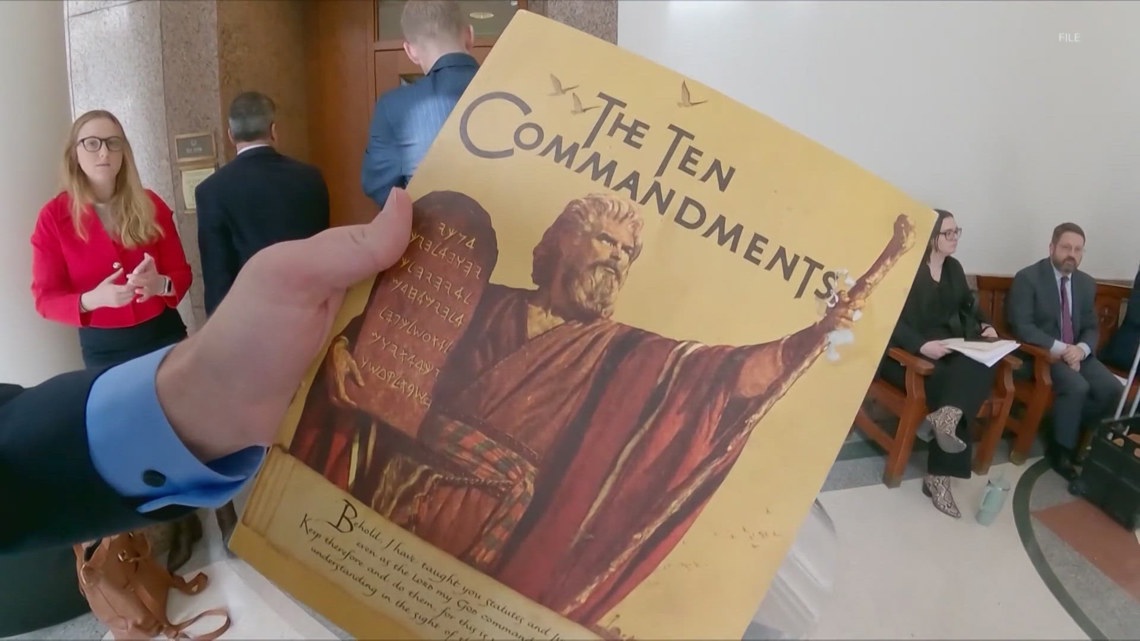
Texas Governor Greg Abbott signs a law requiring the Ten Commandments in all public school classrooms.
AUSTIN, Texas — Texas Governor Greg Abbott signed Senate Bill 10 into law Saturday, making Texas the latest state to require public elementary and secondary schools to display the Ten Commandments in every classroom starting with the 2025-2026 school year.
The new law mandates that all public schools hang a “durable poster or framed copy” of the Ten Commandments in a conspicuous place in each classroom. The displays must be at least 16 inches wide and 20 inches tall, using text large enough to look be read by someone with average vision from anywhere in the classroom.
The bill passed the Texas Senate on March 19 with a 20-11 vote and cleared the House on May 25 with an 82-46 vote. After the House added an amendment, the Senate gave final approval on May 28 with a 21-10 vote, sending it to Abbott’s desk.
Some groups are widely opposed to the law, saying it violates the separation of church and state.
Legal challenge expected
The ACLU has already vowed to file a lawsuit objecting to the law.
Legal experts say the law faces an uphill battle in federal courts. The legislation is nearly identical to a Kentucky law that the U.S. Supreme Court struck down 45 years ago in Stone v. Graham, which ruled that school districts cannot be forced to place the Ten Commandments in classrooms.
But supporters are banking on the current conservative-leaning Supreme Court to overturn that precedent. They argue the Ten Commandments serve a historical rather than religious purpose in schools.
How it will be rolled out
Under the new law, schools are not required to purchase the displays with district funds but must accept privately donated posters that meet the specified requirements. The mandated text follows a traditional version of the Ten Commandments, beginning with “I AM the LORD thy God” and including prohibitions against idolatry, murder, adultery, theft, and bearing false witness.
The law includes strong legal protections for schools. The state attorney general will defend any school facing lawsuits over compliance with the requirement, and Texas will cover all expenses, costs, judgments, or settlements that arise from the legal battles.
Texas joins Louisiana and Arkansas in passing similar laws. A panel of federal appellate judges ruled only on Friday that a Louisiana law requiring the Ten Commandments in public school classrooms is unconstitutional.
The displays must use specific text outlined in the law. The law states that schools cannot be exempt from the requirement “notwithstanding any other law.”
About the Ten Commandments
The Ten Commandments are a set of moral and religious rules given by God to Moses on Mount Sinai, according to the Bible. Dating back to around the 16th–13th centuries BCE, they form the foundation of Jewish law and are important in Christianity and Islam. They remain a powerful symbol in religion and popular culture.
The poster that will be displayed in public schools will have the following words according to the new state law:
“The Ten Commandments
I AM the LORD thy God.
Thou shalt have no other gods before me.
Thou shalt not make to thyself any graven images.
Thou shalt not take the Name of the Lord thy God in vain.
Remember the Sabbath day, to keep it holy.
Honor thy father and thy mother, that thy days may be long upon the land which the Lord thy God giveth thee.
Thou shalt not kill.
Thou shalt not commit adultery.
Thou shalt not steal.
Thou shalt not bear false witness against thy neighbor.
Thou shalt not covet thy neighbor ’s house.
Thou shalt not covet thy neighbor ’s wife, nor his manservant, nor his maidservant, nor his cattle, nor anything that is thy neighbor’s.”
Schools allowed to make time for prayer
Senate Bill 11 was also signed into law Saturday. It allows schools to adopt a policy allowing students and employees to participate in daily, voluntary period of prayer and reading of religious texts.
It requires school boards in Texas to vote whether to requiring prayer and Bible/religious text reading periods at all their schools. The vote must be taken within six months.
Students and employees can only participate if they (or their parents) sign a consent form. These periods cannot replace regular class time.
